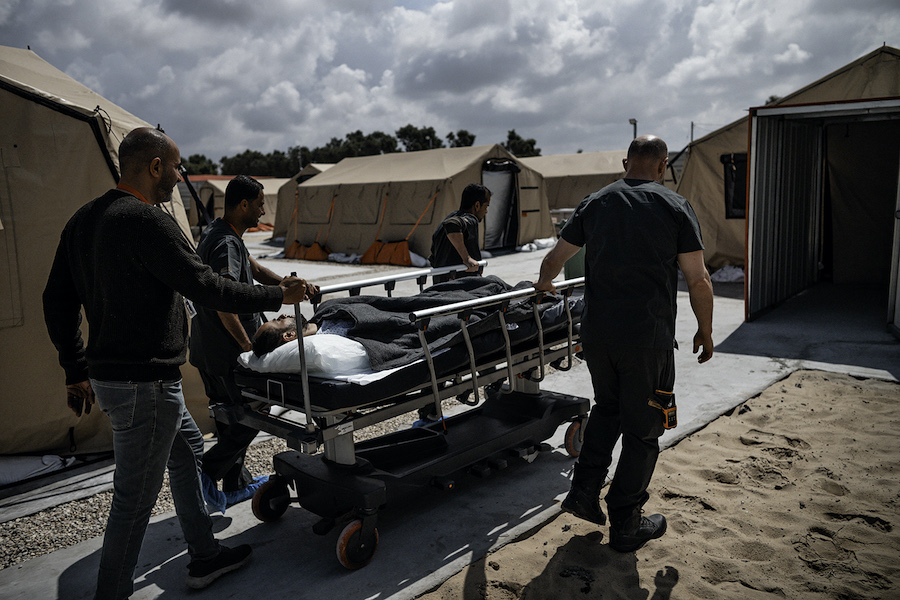When David Anderson OBE crossed back into Gaza this year, the scale of the devastation was immediate. Where once there were roads, houses and markets, there was now rubble. Where children once played, silence. And where exhausted doctors and nurses had worked against the odds last year, they were now hanging on by a thread.
“I’ve worked in conflict zones for over two decades,” said David. “But nothing compares to what I witnessed this time. Whole areas that were barely touched before are now flattened. It’s just destruction upon destruction.”
Anderson, a seasoned emergency nurse and Senior Health Advisor for Manchester-based medical charity UK-Med, had returned to Gaza in early 2024 to help establish and lead operations at two emergency field hospitals. What he found was a population on the brink, millions displaced, hundreds of thousands injured or ill, and a healthcare system brought to its knees.
“I was happy to be back with our Palestinian colleagues,” he said quietly. “But every single one of them looked exhausted. They’d lost weight, lost family, lost homes. And yet they turned up to work. Every single day.”
UK-Med on the front lines in Gaza
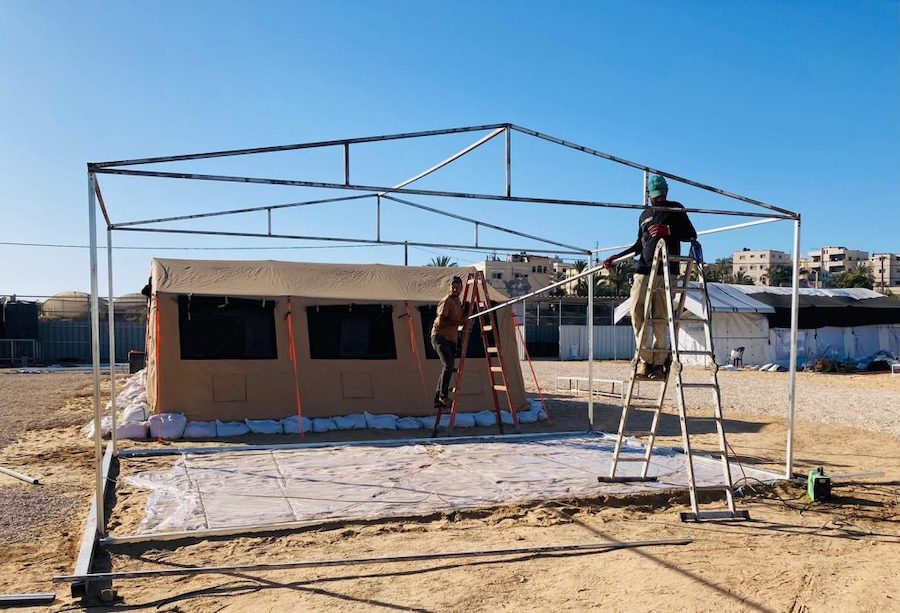 The Deir El Balah Field Hospital
The Deir El Balah Field Hospital
At UK-Med’s field hospital in Al Mawasi, the largest of its Gaza operations, up to 1,000 people a day come through the tents seeking treatment. It includes an emergency department, an operating theatre, an inpatient ward, and a maternal and child health unit. Another hospital in Deir al-Balah handles around 400 patients daily and functions more like a community health centre, managing chronic conditions like hypertension and diabetes, conditions made life-threatening in a region without reliable medication or food.
“There is no such thing as a typical day,” Anderson said. “You might start with dressing wounds or managing blood pressure, and then suddenly you’re in a mass casualty event. Airstrikes, aid truck bombings, building collapses, patients flood in all at once, many of them children.”
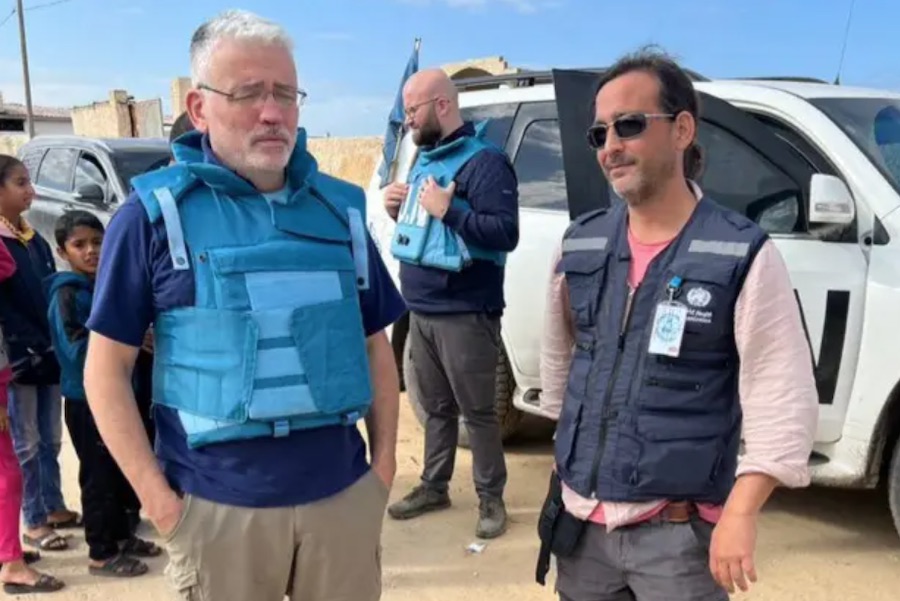 David Anderson OBE (L)
David Anderson OBE (L)
One such incident stays with him. “A father brought in his daughter who had collapsed,” he recalls. “We assumed she was 10 or 11, she was that small. But she was 16, just 26 kilos in weight. Her diabetes was out of control, and she was severely malnourished. Her father looked as starved as she was. They’d been living off bread when they could find it.”
The team stabilised the girl and started treatment, but Anderson is honest about her long-term prospects. “Without sustained access to nutrition, water and insulin, how does a young girl like that survive? What kind of future can she have?”
UK-Med: Delivering urgent medical aid in Gaza and beyond
UK-Med, the Manchester-based emergency medical aid organisation Anderson works for, has a long legacy of responding to crises. Founded in 1988, it grew from a group of South Manchester NHS clinicians who travelled to Armenia to respond to a devastating earthquake. Since then, it has operated in Ukraine, Lebanon, DR Congo, and many more troubled spots around the globe.
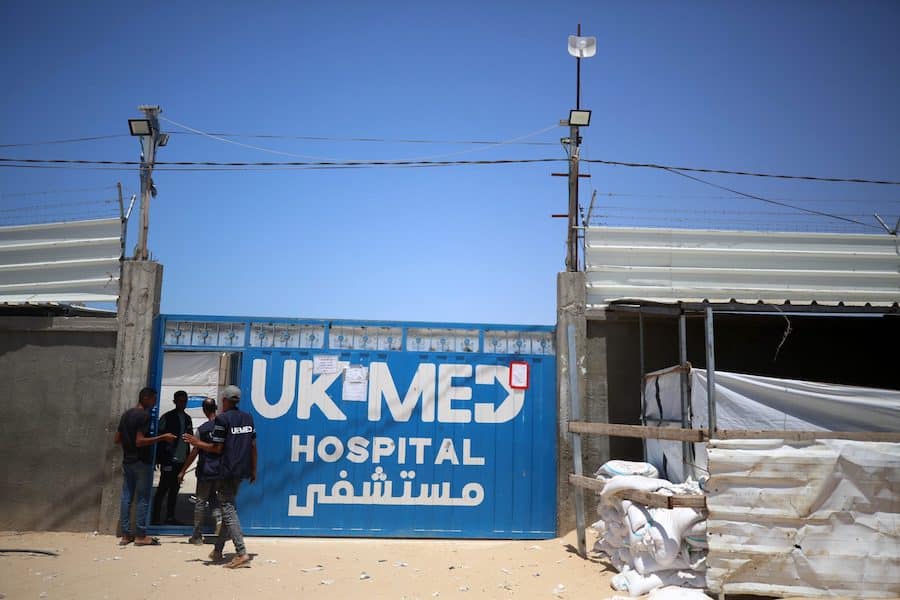 UK Med’s hospital in Gaza
UK Med’s hospital in Gaza
But Gaza, Anderson said, is the hardest deployment yet.
“It’s not just the danger. It’s the complexity. You’re working in a situation where access is severely restricted, the population is constantly displaced, and healthcare itself has become a target.
“The infrastructure is not sufficient to support absolute continuity of care. We do keep up-to-date, contemporaneous records of all care undertaken which is uniquely identified to the patient.
“Where appropriate this information is shared between health care providers in an effort to maximise continuity of care.
Today, UK-Med runs two field hospitals in Gaza and supports a third, the emergency department at Nasser Medical Complex, one of the last functioning hospitals in the south. The conditions are basic, but the needs are massive.
“We’ve treated over 580,000 patients since January,” said Anderson. “It’s a reflection of the scale of suffering here.” For reference, when I Love Manchester spoke to UK-Med last year, they had only helped 140,000 people.
Local acceptance of UK-Med is high. Anderson credits the 500 Palestinian health workers UK-Med employs and trains. “They’re the backbone of what we do. They’ve lost everything, and still they care for others.”
The difficulty in finding essential items in Gaza
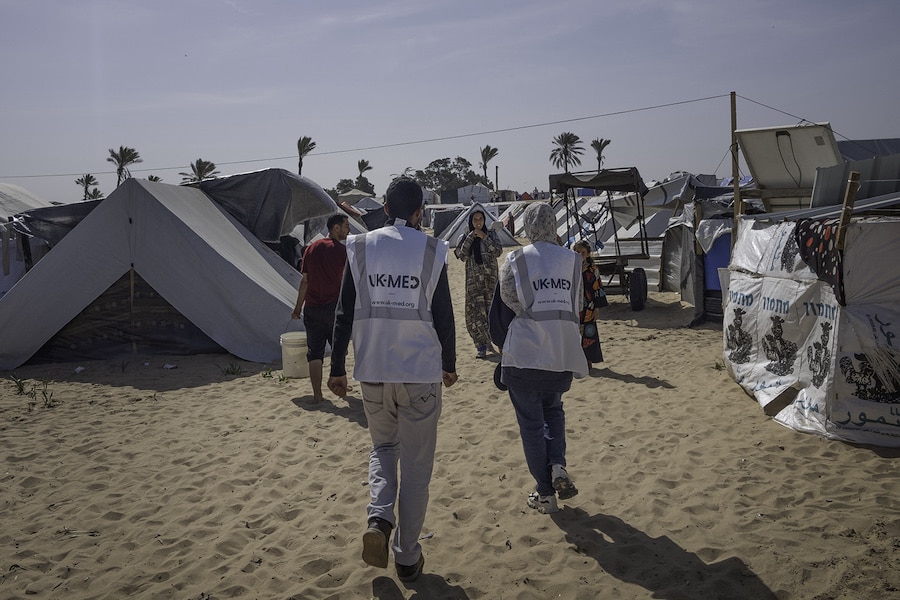
Logistics are a constant nightmare. Essential items like painkillers, wound dressings, antibiotics, even baby formula, sit for months waiting for border permissions. “We ordered supplies over six months ago,” Anderson said. “They’re still not here.”
The shortages aren’t just inconvenient, they’re deadly.
“We’ve had to operate without anaesthetics. We’ve had to reuse gowns, improvise with expired medication. The reality is, patients are dying from conditions that are treatable. If we had even the basic supplies, we could save hundreds more.”
Continuity of care is also nearly impossible. “Most of our patients have been displaced several times. We keep records, we try to transfer information. But often they’re gone before we see them again.”
How do you prepare for life on the frontline?
Sending international clinicians, many from the NHS, into such a volatile zone is not something UK-Med takes lightly.
“We screen everyone extensively,” Anderson explained. “It’s not just about clinical expertise. They need to understand the culture, the security context, the psychological weight of it all.”
Before deployment, new arrivals speak with those already in Gaza or just returned. Once in-country, staff health focal points and access to mental health support are provided. Team meetings happen every morning to share updates, air concerns, and, when necessary, debrief after mass casualty events
How to support humanitarian work in Gaza
UK-Med’s work in Gaza costs around £1 million a month. Until now, the charity has received significant funding from the UK Foreign, Commonwealth & Development Office and the World Health Organization. But that support is ending.
“We’re at a critical tipping point,” said Holly Smith, who leads the organisation’s Gaza Appeal. “We’ve launched an emergency fundraising campaign to keep the hospitals running. Even small donations matter, £35 can fund a single consultation. That consultation could be life-saving.”
Greater Manchester Mayor Andy Burnham has voiced his support in a recent campaign video, urging the public to back the effort.
He said: “The suffering of the people of Gaza is beyond words, with many living without the most basic essentials and often without access to medical care.
“Organisations like UK-Med, based right here in Manchester, are doing extraordinary work to keep the last functioning hospitals going and saving lives every day.
“Their presence on the ground speaks to the values we hold in Greater Manchester: compassion, solidarity, and standing by people in their time of need.”
UK-Med is also reaching out through digital media, partnerships, and email appeals. But time is running out.
“We can’t keep doing this alone,” Anderson warns. “We need governments to step up. We need donors to care. And we need the public to keep talking about Gaza, even when it drops off the headlines.”
Moments of hope do exist in the darkness
Despite everything, moments of hope do exist. Babies born in tents. Burn victims walking again after weeks of rehabilitation. A teenager with shrapnel injuries laughing with a nurse.
“These moments are rare, but they keep us going,” says Anderson. “They remind us that even in war, life insists on continuing.”
How you can help UK-Med
The need in Gaza is immediate and immense. UK-Med is asking the public to:
- Donate: £33 covers an emergency nurse for a day. £100 funds a surgical pack. £300 supports ten consultations.
- Share: Amplify UK-Med’s work on social media.
- Advocate: Write to your MP, demand humanitarian access, and push for funding of front-line medical services.
You can donate to UK-Med’s Gaza appeal by clicking here
As the interview winds down, Anderson reflects on the paradox of his mission.
“We’re here to save lives,” he said. “But in truth, we’re holding the line. We’re giving people a fighting chance in a place where hope has been systematically dismantled.
“We are not miracle workers. We’re nurses, doctors, logisticians. We show up, day after day, and do what we can. That’s what being human looks like.”
